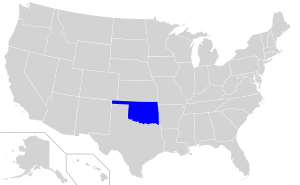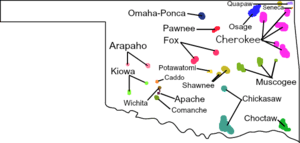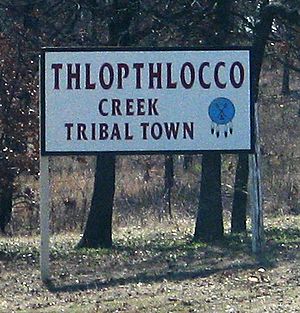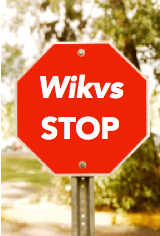Muscogee language facts for kids
Quick facts for kids Muscogee |
||||
|---|---|---|---|---|
| Creek Mvskoke |
||||
| Native to | United States | |||
| Region | East central Oklahoma, Creek and Seminole, south Alabama Creek, Florida, Seminole of Brighton Reservation. | |||
| Ethnicity | 52,000 Muscogee people (1997) | |||
| Native speakers | 4,500 (2015 census)e21 | |||
| Language family |
Muskogean
|
|||
| Official status | ||||
| Official language in | ||||

Current geographic distribution of the Creek language
|
||||

Distribution of Native American languages in Oklahoma
|
||||
|
||||
The Muscogee language (also called Muskogee or Creek) is a special language spoken by the Muscogee (Creek) and Seminole people. Most speakers live in the US states of Oklahoma and Florida. When Seminole people speak it, sometimes along with Mikasuki, it is known as Seminole.
Long ago, the Muscogee language was spoken by different groups of Muscogee people in what is now Alabama and Georgia. It is related to other languages like Hitchiti-Mikasuki, but they are not exactly the same.
The Muscogee people first brought their language to Florida in the early 1700s. There, they joined with other groups and became known as the Seminole. However, in the 1830s, the US government made most Muscogee and Seminole people move west of the Mississippi River to what was called Indian Territory.
Today, about 5,000 people speak Muscogee. Most of them live in Oklahoma and are part of the Muscogee Nation or the Seminole Nation of Oklahoma. About 200 speakers are Florida Seminole. The Seminole speakers have developed their own unique ways of speaking the language.
Contents
Keeping the Muscogee Language Alive
The Creek language is still widely spoken among the Creek people. The Muscogee Nation works hard to keep the language alive. They offer free language classes and special camps where Creek children can learn to speak Muscogee.
Learning Muscogee Today
Many places offer ways to learn the Muscogee language. The College of the Muscogee Nation has a special program to get a language certificate. Public schools in Tulsa, the University of Oklahoma, and libraries in Glenpool, Holdenville, Okmulgee, and Tulsa also offer Muscogee Creek language classes.
In 2013, the Sapulpa Creek Community Center had 14 students finish its Muscogee language class. In 2018, the Seminole Nation helped 8 teachers learn Muscogee. These teachers now help bring the language back to students in elementary and high schools across the state.
Sounds of Muscogee Language
The Muscogee language has 13 consonant sounds and 3 main vowel sounds. These vowel sounds can be short or long, and they can also have different tones (like how your voice goes up or down). Some sounds can also be "nasal," meaning air comes out of your nose when you say them.
Muscogee Consonant Sounds
Here are some of the consonant sounds in Muscogee:
| Lips | Alveolar (behind teeth) | Palate (roof of mouth) | Velar (back of mouth) | Glottal (throat) | ||
|---|---|---|---|---|---|---|
| Central | Side | |||||
| Nasal | m | n | ||||
| Stop | p | t | ch (like in "church") | k | ||
| Friction | f | s | hl (no English sound) | h | ||
| Smooth | w | l | y | |||
Stop Sounds (Plosives)
Muscogee has four main stop sounds: p, t, ch, and k. These sounds are made by completely blocking air and then releasing it. For example, the "ch" sound is like the "ch" in "church." Sometimes, these sounds change a bit depending on where they are in a word. For instance, "k" can sometimes sound like a "q" or "g" in the back of your throat, especially when it's near an "o" sound.
Friction Sounds (Fricatives)
There are four friction sounds in Muscogee: f, s, hl, and h. These sounds are made by letting air squeeze through a narrow space. The "f" sound can be made with your lips or your lips and teeth. The "s" sound is usually like the "s" in "spot," but some speakers in Florida make it sound more like "sh." The "hl" sound is unique and doesn't exist in English. You make it by blowing air around the sides of your tongue while trying to say "l." The "h" sound can sometimes sound like a "ch" from the back of your throat, especially after an "o" sound.
Smooth Sounds (Sonorants)
The smooth sounds in Muscogee are m, n, w, y, and l. These sounds are always voiced, meaning your vocal cords vibrate when you say them. Sometimes, the "n" sound changes to an "ng" sound (like in "sing") when it's before a "k." Also, if these sounds are followed by an "h" in the same part of a word, they can lose their voice and become voiceless.
Longer Sounds (Geminates)
In Muscogee, many consonant sounds can be made longer, like holding the sound for a bit. This is called "gemination." For example, you can have a longer "p" or "s" sound. Some smooth sounds can also be made longer, but it's less common.
Muscogee Vowel Sounds
Muscogee has three short vowel sounds (i, a, o) and three long vowel sounds (i:, a:, o:). The long vowels are held slightly longer than the short ones.
| Front | Central | Back | |
|---|---|---|---|
| Close | i, i: | ||
| Close-mid | o, o: | ||
| Open | a, a: |
Short Vowels
The short vowels (i, a, o) can sometimes sound a bit softer or more central, especially if they are next to certain consonant sounds or in a closed part of a word. Sometimes, the first vowel in a word can even disappear, which can make the next part of the word sound higher in pitch.
Long Vowels
The three long vowels (i:, a:, o:) are always clear and never sound softer or more central. If a long vowel is followed by a smooth sound in the same part of a word, the vowel usually becomes shorter.
Combined Vowel Sounds (Diphthongs)
Muscogee has three combined vowel sounds, called diphthongs. These are like two vowel sounds blended together. They sound similar to:
- eu like the exclamation "ew!"
- ue like the "oy" in "boy"
- vo like the "ow" in "how"
Nasal Vowels
Both short and long vowels can be nasalized, meaning air comes out of your nose when you say them. Nasal vowels often appear when sounds combine or when a word's meaning is intensified. For example, "likoth-" means "warm," but "likŏ:nth-os-i:" means "nice and warm."
Voice Tones in Muscogee
Muscogee uses different tones (high, low, or falling) to change the meaning of words. These tones are usually not written down in the alphabet, only in special language books. For example, changing the tone of a verb can change its meaning from "she is putting on (a dress)" to "she is wearing (a dress)."
Writing Muscogee: The Alphabet
The traditional Muscogee alphabet was created in the late 1800s and has 20 letters. Even though it uses letters from the Latin alphabet (like English), some sounds are very different from English.
Here's how some Muscogee letters sound, compared to English words:
| Spelling | Sound (IPA) | English equivalent |
|---|---|---|
| a | aː ~ a | like the "a" in father |
| c | tʃ ~ ts | like the "ch" in such or the "ts" in cats |
| e | ɪ | like the "i" in hit |
| ē | iː | like the "ee" in seed |
| f | f | like the "f" in father |
| h | h | like the "h" in hatch |
| i | ɛ ~ ɛj | like the "ay" in day |
| k | k | like the "k" in skim |
| l | l | like the "l" in look |
| m | m | like the "m" in moon |
| n | n | like the "n" in moon |
| o | oː ~ ʊ ~ o | like the "o" in bone or the "oo" in book |
| p | p | like the "p" in spot |
| r | ɬ | A sound not in English, made by blowing air around the sides of the tongue while saying "l." |
| s | s | like the "s" in spot |
| t | t | like the "t" in stop |
| u | ʊ ~ o | like the "oo" in book or the "oa" in boat |
| v | ə ~ a | like the "a" in about |
| w | w | like the "w" in wet |
| y | j | like the "y" in yet |
How Consonants Change Sounds
In Muscogee, some consonants change their sound when they are between two "smooth" sounds (like vowels or m, n, l, w, or y). These consonants are p, t, k, c, and s.
- c can sound like the "j" in just.
- k can sound like the "g" in goat.
- p can sound like the "b" in boat.
- s can sound like the "z" in zoo.
- t can sound like the "d" in dust.
Also, some combinations of consonants can be written in different ways but sound the same. For example, the verb ending for "you are stopping" can be written as wikeckes or wiketskes, but both are pronounced the same way.
Understanding Vowel Length
The length of a vowel (whether it's short or long) is important in Muscogee, but it's not always shown clearly in the traditional way of writing.
- The short vowel v often matches the long vowel a.
- The short vowel e often matches the long vowel ē.
- The short vowel u often matches the long vowel o.
However, these rules don't always apply, so sometimes a short "a" is written as a, or a long "i:" is written as e.
Muscogee Grammar Basics
Muscogee grammar is quite different from English! A single Muscogee verb can sometimes mean a whole English sentence.
Word Order
In Muscogee sentences, the usual order is: Subject - Object - Verb. This means who or what is doing the action comes first, then what the action is done to, and finally the action itself. For example, "The boy the ball throws."
Grammatical Case
Muscogee uses small words called "clitics" to show the role of a noun in a sentence.
- -t is used for the subject (the one doing the action).
- -n is used for other nouns, like the direct object (what the action is done to) or indirect object (to whom or for whom).
Sometimes, these markers are left out, especially if it's clear what the noun's role is, or in common phrases like "go to town."
Verbs
Muscogee verbs are very powerful! They change their form to show many different things:
- Who is doing the action:
* Letketv means "to run." * Lētkis. = I am running. * Lētketskes. = You are running. * Lētkes. = He / She is running.
- Who the action is done to: This is shown with prefixes (small parts added to the beginning of the verb).
* Hecetv = to see. * Cehēcis = I see you. * Cvhēcetskes. = You see me.
- When the action happens (Tense): Muscogee has many tenses to show exactly when something happened or will happen.
* Pohetv = to hear. * Pohis. = I am hearing (now). * Pohhis. = I just heard (very recently). * Pohares. = I will hear (in the future). * There are many more tenses, like for things that happened a week ago, a year ago, or even long, long ago!
- The way the action happens (Mood):
* Wiketv = to stop. * Wikes. = He / She is stopping (a fact). * Wikvs. = Stop! (a command). * Wike wites. = He / She may stop (a possibility).
- How the action is done (Aspect): This shows if an action is ongoing, completed, or repeated.
* Kerretv = to learn. * Kērris. = I am learning (ongoing). * Kêrris. = I know (a result). * Kęrris. = I keep learning (repeatedly).
- Active or Passive Voice:
* Wihkis. = I just stopped (active). * Cvwihokes. = I was just stopped (passive).
- Negatives: To say "not."
* Wikarēs. = I will stop. * Wikakarēs. = I will not stop.
- Questions:
* Hompetskes. = You are eating. * Hompetskv? = Are you eating? (yes/no question) * Naken hompetska? = What are you eating? (asking for more info)
Verbs with Irregular Plurals
Some Muscogee verbs, especially those about moving, have special forms for when more than one person is doing the action. For example, "to run" is letketv for one person, but tokorketv for two people, and pefatketv for three or more!
Descriptive Verbs (Stative Verbs)
Muscogee has a special type of verb called "stative verbs." These verbs don't show an action but describe a condition, like being sick or being tall. In English, we use adjectives for this (e.g., "I am sick"). In Muscogee, these are treated like verbs, but they change their prefix (the beginning part) to show who is being described.
- enokkē = to be sick
- enokkēs = he / she is sick
- cvnokkēs = I'm sick
- cenokkēs = you are sick
Location Prefixes
Muscogee uses prefixes to show where an action is happening, similar to how English uses words like "up," "in," or "around" with verbs.
- vyetv = to go (for one person)
- ayes = I am going
- ak-ayes = I am going (in water / in a low place / under something)
- tak-ayes = I am going (on the ground)
- oh-ayes = I am going (on top of something)
Possession
Showing who owns something in Muscogee is done in two different ways, depending on the type of noun.
Things in Fixed Relationships (Inalienable Possession)
Some things, like body parts or family members, are always connected to a possessor. You can't just say "hand" in Muscogee; you have to say "my hand," "his hand," etc. This is done with special prefixes.
- enke = his / her hand
- cvnke = my hand
- cenke = your hand
- punke = our hand
Even if you say the person's name, you still use the prefix. For example, Toskē enke means "Toske's hand" (literally, "Toske his hand").
Transferable Nouns
For other nouns, like objects you can own, a separate set of pronouns is used to show possession.
- efv = dog
- vm efv = my dog
- cem efv = your dog
- em efv = his / her dog
- pum efv = our dog
Again, even if you say the person's name, you still use the pronoun. Toskē em efv means "Toske's dog" (literally, "Toske his dog").
Location Nouns
Muscogee also has special "location nouns" that act like prepositions in English (like "behind," "around," "beside"). These are possessed just like body parts.
- cuko = house; yopv = noun for "behind"; cuko yopv = behind the house
- cvyopv = behind me
- ceyopv = behind you
- eto = tree; lecv = under; eto lecv = under the tree
- tempe = near; cvtempe = near me; cetempe = near you; putempe = near us
Examples
Here are some Muscogee words for family members:
- Erke. = Father.
- Ecke. = Mother.
- Pauwv. = Maternal Uncle (mother's brother).
- Erkuce. = Paternal Uncle (father's brother).
- Eckuce. = Aunt.
- Puca. = Grandpa.
- Puse. = Grandma.
- Cēpvnē. = Boy.
- Hoktuce. = Girl.
Male vs. Female Speech
In the past, around the late 1700s, there were different ways men and women spoke Muscogee. Men would add special endings to verbs, while women would put emphasis on different parts of words. These differences were noted in the first grammar book of the Creek language (from 1860) and continued into the 20th century in Muscogee and related languages.
Seminole Dialects
The Muscogee language spoken by the Seminole people in Oklahoma and Florida has developed into different dialects (versions).
- Oklahoma Seminole speak a dialect called Oklahoma Seminole Creek.
- Florida Seminole Creek is one of two languages spoken by Florida Seminoles. It is less common than the Mikasuki language.
The Florida Seminole dialect is said to be the most unique. It is described as "rapid" and "staccato" (short, sharp sounds). It also has more words borrowed from Spanish and Mikasuki, rather than English. Sadly, the Florida Seminole dialect is the most endangered version of Muscogee.
See also
 In Spanish: Idioma maskoki para niños
In Spanish: Idioma maskoki para niños



